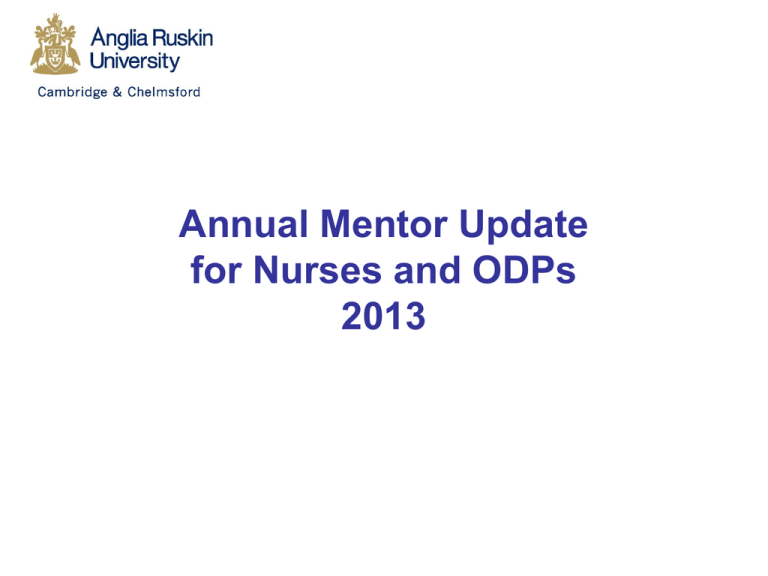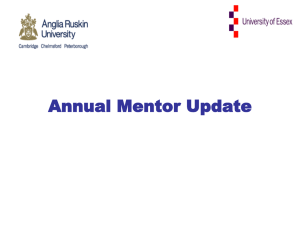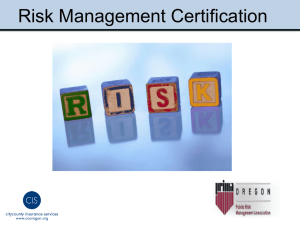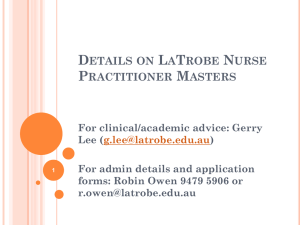Peterborough annual mentor update
advertisement

Annual Mentor Update for Nurses and ODPs 2013 Clinical Learning Environment What makes an effective learning Environment? 2 Clinical Learning Environment • The Mentor for Nurses or ODPs • The Student • The Ward/department • The University • Preparation for student: • mentor allocation • induction pack • orientation • duty rota • learning opportunities • appropriate support/meetings What are the professional requirements to remain on the ‘live’ mentor register as stated by the NMC (SLAIP 2008) or CODP(2009)? 4 NMC Mentor Standards (SLAIP 2008) • Have successfully completed an NMC approved mentor preparation programme • Have participated in an annual (12 months) Mentor Update • Have an understanding of ‘due regard’ • Participate in a Triennial Review process to ensure NMC standards are met • Support and summatively assess two students within the three year cycle 5 CODP Mentor Standards ( 2009) • To be maintained on the local register the individual must have evidence of having: • 1. Mentored at least two students within the two year period. • 2. Participated in ODP specific update every two years. • 3. Undertaken work based / informal learning relevant to their role as a mentor. • 4. Undertaken professional activity • 5. Develop knowledge and understanding of their role through formal education activity. • 6. Undertaken the appropriate mentorship qualifications 6 Triennial Review (nurses) • Three yearly cycle of reflection of mentor practice against NMC standards • The process is a self assessment of your skills as a mentor • As a quality process a discussion will be held with your line manager or appropriate other • Will need to provide evidence of professional development • A checklist is available to support this process. • The Mentor Register is then updated 7 Biannual review (ODPs) • Two yearly cycle of reflection of mentor practice against CODP standards • The process is a self assessment of your skills as a mentor • As a quality process a discussion will be held with your line manager or appropriate other • Will need to provide evidence of professional development • A checklist is available to support this process. • The Mentor Register is then updated Due regard • • • • • A mentor for nurses has the specialist skills required to support the placement learning outcomes. is from the same part of the register and field of practice as the student in the final year of the programme has completed a mentor qualification can mentor ODPs • • • A mentor for ODPs has completed a mentor qualification can only mentor ODPs not nurses Associate mentor • Nurses • No mentor qualification • Cannot sign paperwork • • • • • ODP’s Minimum 6 months experience Attend mentor update Complete biannual review Performs formative assessment Mentor • • • • Nurses Holds a mentor qualification: at level 2 or 3 Performs summative assessments • • • • ODPs Holds mentor qualification: at level 3 (6) or at level 2 (5) and completed level 3 (6) study • Performs summative assessments Practice Educator • Nurses • Not required • ODP’s • Minimum 3 yrs experience • Holds a degree or working towards a degree • Has overall responsibility for students in placement Sign Off mentors for nursing students (not required for ODP students) • Sign Off mentors are required for: • All student nurses in their final placement • Overseas Nursing programmes • Return to Practice students • A Sign Off mentor is a nurse who has met the additional criteria • Sign Off Mentors make judgements as to whether a student has achieved the required standards for entry on to the NMC register. 13 Prospective Sign Off Mentor To become a Sign Off mentor you will need: • To be supervised by a qualified Sign Off Mentor on 3 occasions assessing a student – two via simulation – one with an actual student – annotated on to the Mentor register following review of evidence of above (NMC 2008, NMC Circular 05/2010) Sign Off Mentors for nursing students • Sign Off Mentors make the final decision – as to whether a student has achieved the required standards for entry on to the NMC register 15 RESPONSIBILITIES OF THE STUDENT 16 Student responsibilities • To arrive on duty on time, smartly dressed. • To follow the stated sickness/absence procedure. • To take responsibility for his/her own learning by coming prepared to meetings with the mentor • Ensure that deadlines are met • To act professionally at all times • Work with their mentor • Work the shift patterns such as nights and weekends • Fixed annual leave 17 YOUR RESPONSIBILITIES WHEN WORKING WITH STUDENTS 18 Francis report • Report commissioned by the Secretary of State for Health carried out by Robert Francis QC • Published 6th Feb 2013 • 209 recommendations: • Focus on developing the right culture in the NHS through leadership, training, information and transparency 19 NHS constitution • Working together to ensure students are supervised and assessed by mentors who support care that embraces the underpinning principles and values of the NHS Constitution and the 6 C’s in Nursing: – – – – – – Care Compassion Competence Communication Courage Commitment It is important to ensure that all students: • Are supernumerary • Are on the duty rota for Health and safety reasons • Actively engage in hands on delivery of care as appropriate • Have a named mentor who is available for a minimum of 40% of the time • Participate in the 24 hour cycle of care 21 You may be supervising: • ARU nursing students on the September 07 nursing programme. • ARU nursing students on the all graduate programme which commenced in September’11. • ARU ODP students on 2 year diploma programme. 22 NURSES ODP student journey Year 1 Year 2 Trimester 1 Trimester 2 Trimester 3 Anaesthetics Surgery Post-anaesthetic care Anaesthetics Surgery Trimester 4 Trimester 5 Trimester 6 Anaesthetics Surgery Post-anaesthetic care (critical Care/ED) Supporting students • What obstacles do you envisage? • What support is available? 25 Assessing students • • • • • • • • Induction/Initial Meeting Learning Contracts/Action plans Interpersonal skills profile / core professional values Service user views – why? Cause for Concern Fine Grading Formative assessment Summative assessment 26 Grading in practice • When deciding the grade/score for the individual student assessment consider carefully; – How you are going to evidence/explain the reason for your decision 27 Supporting the failing student • Essential to have robust and transparent processes in place • Investigate why your student may be having difficulties • Clear action planning • Comprehensive documentation as evidence • Use of support networks • Pick up problems early!!! 28 Learning Contracts /Action Planning • Use of Specific, Measurable, Achievable, Realistic, Timely, (SMART) objectives • Clear review dates • Use of support networks 29 Support in practice Remember • you are not expected to deal with student issues or concerns on your own • there is a network of support for mentors available from your own Organisation, the HEI and the Commissioning body RESPONSIBILITIES OF THE HIGHER EDUCATION INSTITUTE 31 • To provide theoretical and practical teaching (skills lab) which will inform students in practice • To liaise closely with, and support, mentors and placement providers • With placement providers, monitor, develop and evaluate the quality of the learning environment eg audits • To respond to driving forces such as statutory bodies , placement providers and the public 32 RESPONSIBILITIES OF THE PLACEMENT PROVIDER 33 • Works with the HEI to maintain an up-to-date register of current mentors, sign off mentors and practice teachers. • Local agreement to undertake triennial review • Supports mentors to access annual updates • Ensures mentor works 40% of time with their student • Ensure one hour protected time allocated for individuals acting as sign off mentors • Supports the triennial review process 34 Monitoring the quality of the learning environment: Educational Audit • NMC require evidence of 2 yearly audits of the learning environment • The audit needs to provide evidence of: • Orientation/induction for students • Professional development of staff • Scope of the learning environment • Student evaluations and responses to these • Action plans in response to issues/concerns • Review of capacity 35 The good news: • NMC visited ARU in November 2012 • Nursing Times award • Student focus groups feedback 36 Thank you…. for attending today and for your continued support of students in practice. On line information • To support this presentation please access the link below for the information and guidance included in this presentation • www.anglia.ac.uk/mentors Scenario For Discussion 1st year Student nurse Louise Martin approaches you and is very tearful. She says that her mentor is off sick and her second mentor is on annual leave. Her practice document is due to be handed in to the University in three weeks time and she does not want to fail. What should you do? 39 • Find out who Louise’s mentor and co-mentor are and verify when they went off on holiday/sick leave and when they are likely to be back • Look at Louise’s practice document and establish how much has been completed/how much still needs to be completed • Establish when the document is due be handed in and if the formative assessment is due • Depending on your seniority, take your findings to the ward manager/student link nurse to resolve the situation • Inform the Education Champion/Link Lecturer/PEF of the situation Scenario For Discussion As Julie’s mentor you have approached a patient anonymously to obtain feedback on the patient experience of being cared for by your student The patient replies that she would ‘never want to be nursed by her again’ Will You • Decide to ask another patient for her views in the hope that they will be more positive? • Sit down with the patient and ask her why she feels like this? • Go straight to Julie and ask her why she thinks ‘a’ patient might have said this? • Ask Julie to reflect on the patient views and all the formative feedback given so far? • Fail Julie in this placement because of the effect she has had upon the patient? 42 Scenario For Discussion You are mentoring a student nurse who is at the end of the second year of her course. It is the time for her formative assessment and you are very concerned about her attitude and her ability. When you try to discuss this with her, the student becomes very defensive saying that she has never received such negative comments before. This makes you feel very uncomfortable and you do not feel that you can proceed with writing the action plan. 43 DO YOU: • E mail your PEF to discuss the problem • Seek support from your colleagues • Seek support from the HEI/link team • Decide to give the student the benefit of the doubt and write a more positive formative report. • Fill in a ‘cause for concern’ form. 44








